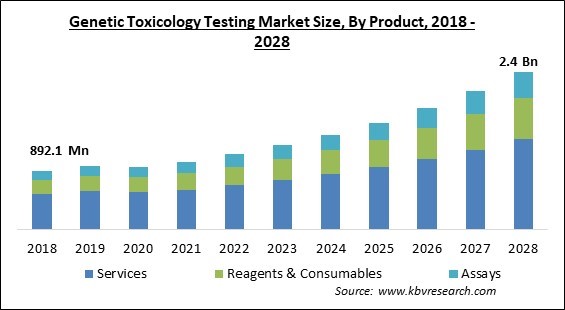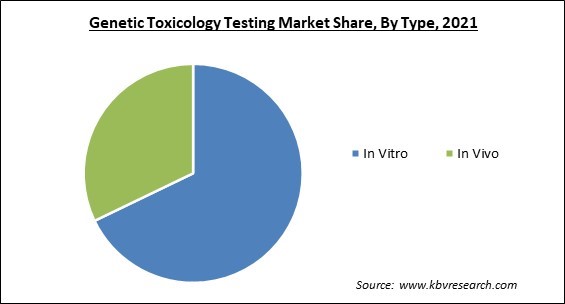The Global Genetic Toxicology Testing Market size is expected to reach $2.4 billion by 2028, rising at a market growth of 13.2% CAGR during the forecast period.
The genetic toxicology testing research and observes the consequences of numerous physical, biological, and chemical substances on the heredity of live creatures. Genetic toxicology is the study of the harmful outcomes of DNA damage. These examinations are carried out either to detect chromosomal damage or gene mutation.

Agrochemicals, pharmaceutical impurities, chemicals utilized in the cosmetics industry, pharmaceutical medications, and industrial chemicals are all subjected to toxicological studies. Genetic toxicology is a crucial component of research and development (R&D), where novel medications are developed and designed through a variety of studies. These tests aid in the development of novel medications and vaccinations.
These studies also concentrate on in vitro drug discovery and tailored pharmaceuticals. In addition to these applications, there is a growing need for humanized animal models, which will present a plethora of chances for the major competitors in the genetic toxicology testing market. Testing for genetic toxicity has a variety of uses in the cosmetics, food, pharmaceutical, and biotech industries.
The requirement for genetic toxicology information is predicted to increase due to the increased medication research and discovery as well as the expanding usage of pharmacogenomics. This is because it can evaluate the substances that can cause chromosomal damage or genetic alterations. A significant growth factor in the genetic toxicity testing field is also the development of facilities and the availability of funding globally.
Due to lockdowns that have halted manufacturing operations and enforced travel restrictions, affecting the transit of shipments, the rapid expansion of COVID-19 has resulted in a lack of medical equipment and supplies. COVID-19 has not severely affected the availability of raw materials used in genetic toxicology, with the exception of transportation-related delays brought on by travel restrictions and labor scarcity difficulties. Toxicology research was being conducted to comprehend the virus mutation. Similar to this, many researchers used genotoxic to evaluate how well medications worked on the COVID-19 virus. Therefore, it can be said that the pandemic had a positive impact on the genetic toxicology testing market.
By raising the adoption of substances in the preclinical phases, R&D operations primarily aim to raise the overall likelihood of acceptance of Phase I therapeutic candidates. In the initial stages of medication development, intense R&D activities are carried out to accomplish this. The necessity for genetic toxicology research is consequently increased. Before a medicine enters the pricey clinical stages, higher R&D expenditures in the early phases of drug products are also anticipated to enhance the usage of in vivo toxicity techniques.
More and more biomedical research applications use humanized mice as test subjects. Professors at Yale University and the Jackson Laboratory (US) were awarded a three-year grant in 2017 to perform advanced research on humanized MISTRG models for understanding the biology of human melanoma along with identifying therapeutic targets. The Connecticut Bioscience Innovation Fund (CBIF) awarded the Jackson Laboratory and Yale University (US) a grant in the amount of USD 700,000 in November 2018. This award supported scientific collaboration to create humanized mouse models that correctly reflect how people react to disease and cancer treatments.
Given that human proteins and antibodies make over half of the novel medications created, autoimmune disease and immunological activation are crucial endpoints for drug development. These medicinal compounds can only yet be tested in animal models. The use of in vitro genetic toxicology testing techniques does not permit the assessment of the response induced within a body following secondary infection. These techniques can't assess how well a body recovers in response to short-term versus long-term immunosuppression.

Based on product, the genetic toxicology testing market is classified into reagents & consumables, assays, and services. The service segment procured the largest revenue share in the genetic toxicology testing market in 2021. The segment expansion is being fuelled by Contract Research Organizations' (CROs') growing strategic ambitions through investment in this sector. The rising scope of services in the epidermis and genetic toxicological testing is another factor fuelling the service sector. For instance, in order to meet the growing demand around the world, Gentronix announced that the scope of its services in the field of cutaneous toxicity will be expanding.
On the basis of type, the genetic toxicology testing market is bifurcated into In Vitro and In Vivo. The in vivo segment procured a significant revenue share in the genetic toxicology testing market in 2021. An essential component of medical research generally is in vivo testing, particularly in clinical trials. Studies conducted in living organisms (in vivo) offer useful knowledge about a substance's effects or the progression of a disease. Clinical trials and animal studies are the two main categories of in vivo testing.
By application, the genetic toxicology testing market is segmented into pharmaceutical & biotechnology, food industry, cosmetics industry, and other. The pharmaceutical and biotechnology segment witnessed the maximum revenue share in the genetic toxicology testing market in 2021. It is projected that one of the driving forces behind the rise will be the extensive utilization of genotoxicity testing in medicine development and research. Testing for genetic toxicity is done at the preclinical stage. Additionally, it is predicted that the biotechnology and pharmaceutical sector will increase at a fast pace as well. Given that testing is necessary for all quantities of medications and substances.
| Report Attribute | Details |
|---|---|
| Market size value in 2021 | USD 1 Billion |
| Market size forecast in 2028 | USD 2.4 Billion |
| Base Year | 2021 |
| Historical Period | 2018 to 2020 |
| Forecast Period | 2022 to 2028 |
| Revenue Growth Rate | CAGR of 13.2% from 2022 to 2028 |
| Number of Pages | 199 |
| Number of Tables | 349 |
| Report coverage | Market Trends, Revenue Estimation and Forecast, Segmentation Analysis, Regional and Country Breakdown, Companies Strategic Developments, Company Profiling |
| Segments covered | Product, Type, Application, Region |
| Country scope | US, Canada, Mexico, Germany, UK, France, Russia, Spain, Italy, China, Japan, India, South Korea, Singapore, Malaysia, Brazil, Argentina, UAE, Saudi Arabia, South Africa, Nigeria |
| Growth Drivers |
|
| Restraints |
|
Region-wise, the genetic toxicology testing market is analysed across North America, Europe, Asia Pacific and LAMEA. The North American region witnessed the highest revenue share in the genetic toxicology testing market in 2021. The dominance in the region can be due to rising medication development and significant pipeline spending. Additionally, the presence of important actors in the region makes genotoxicology testing more accessible for local pharmaceutical and biotech firms. The significant share of this industry is due to the growth of structure-based medication designs, rising financing for life sciences research, high R&D costs in the biopharmaceutical industry, and the burgeoning uptake of cutting-edge techniques in North America.
Free Valuable Insights: Global Genetic Toxicology Testing Market size to reach USD 2.4 Billion by 2028
The market research report covers the analysis of key stake holders of the market. Key companies profiled in the report include Thermo Fisher Scientific, Inc., Charles River Laboratories International, Inc., Laboratory Corporation of America Holdings, Eurofins Scientific Group, Jubilant Pharmova Limited., Syngene International Limited, Gentronix Ltd., Inotiv Inc., Creative Bioarray and MB Research Laboratories.
By Product
By Type
By Application
By Geography
The global Genetic Toxicology Testing Market size is expected to reach $2.4 billion by 2028.
Rising investments in pharmaceutical R&D by companies are driving the market in coming years, however, Insufficient verified in vitro models for complex endpoint research restraints the growth of the market.
Thermo Fisher Scientific, Inc., Charles River Laboratories International, Inc., Laboratory Corporation of America Holdings, Eurofins Scientific Group, Jubilant Pharmova Limited., Syngene International Limited, Gentronix Ltd., Inotiv Inc., Creative Bioarray and MB Research Laboratories.
The In Vitro market is leading the Global Genetic Toxicology Testing Market by Type in 2021; thereby, achieving a market value of $1.6 billion by 2028.
The Cosmetics Industry market shows the high growth rate of 13.7% during (2022 - 2028).
The North America market dominated the Global Genetic Toxicology Testing Market by Region in 2021; thereby, achieving a market value of $866.8 million by 2028.
Our team of dedicated experts can provide you with attractive expansion opportunities for your business.

